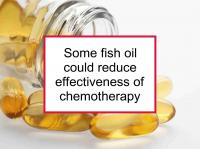The authors have published a new study in which they confirm that consuming fish oil supplements, herring or mackerel could neutralize the treatment effects of platinum-based chemotherapy such as cisplatin.
Marine fatty acids
Fatty acids are components of lipids. Broadly speaking, lipids are types of fats, including oils, waxes, hormones, fat-soluble vitamins, triglycerides, and others. Lipids form an important part of cell membranes. Lipids normally are made up of fatty acids plus other molecules. For example, triglycerides consist of three fatty acids bonded with glycerol. Omega-3 marine fatty acids are found primarily in fatty fish, marine algae and shellfish. The most important are eicosapentaenoic acid (EPA) and docosahexaenoic acid (DHA). However, each serving of these foods normally contains multiple types of fatty acids in various proportions.
Relatively high fatty fish intake has been shown to be associated with reduced risk of breast cancer and improved survival. In one experiment, higher omega-3 to omega-6 fatty acid diets reduced mammary gland density, which in turn reduced carcinogen-induced mammary tumor development. Fish oil has been shown to inhibit early stages of mammary tumor development in a mouse model of HER2-positive (HER2+) breast cancer. DHA has been demonstrated to reduce bone metastasis in a mouse model of breast cancer. Marine fatty acids have also been found to enhance the therapeutic effects of what to eat during tamoxifen treatment and chemotherapy drugs such as doxorubicin and paclitaxel.
Latest research: Fish oil, herring or mackerel hinder chemotherapy
The study referenced at the beginning of this news story was designed to determine exposure to the fatty acid hexadeca-4,7,10,13-tetraenoic acid (16:4(n-3)) after consumption of fish or fish oil supplements. The study consisted of three separate parts: (1) determine the use of fish oil supplements among patients undergoing cancer treatment at the University Medical Center in Utrecht, Netherlands; (2) determine levels of 16:4(n-3) in three brands of fish oil and four species of fish; and (3) determine circulating levels of 16:4(n-3) in healthy subjects after consuming fish oil or fish. The authors also performed experiments in mice to determine the degree of chemoresistance caused by 16:4(n-3). Addition of 1 µL of fish oil during cisplatin treatment was sufficient to induce chemoresistance—treatment had no impact on the growth rate of tumors in the presence of the associated 16:4(n-3).
Part 1: 400 cancer patients treated at the University Medical Center Utrecht (Netherlands) were sent a questionnaire in November 2011 to determine their use of fish oil supplements. A total of 118 patients (30%) responded to the questionnaire, of whom 13 (11%) reported using omega-3 supplements.
Part 2: Levels of 16:4(n-3) content of six fish oils and four different fish were determined. All the fish oils contained 16:4(n-3) in amounts likely to cause chemoresistance, from 0.2 to 5.7 µM. Herring and mackerel were also found to contain high levels of 16:4(n-3), in contrast to insignificant levels in salmon and tuna.
Part 3: Healthy volunteers were tested to determine plasma levels of 16:4(n-3) after consuming three different brands of fish oil supplements or four different fish species. Thirty healthy volunteers participated in the fish oil study; 20 were in the fish study. Increases in plasma 16:4(n-3) levels, reaching up to 20 times baseline levels, were observed when the recommended daily amount of 1,000 mg of fish oil was given to healthy volunteers. Levels of 16:4(n-3) returned to close to normal eight hours after a 1,000 mg dose of fish oil dose was ingested; a 5,000 mg dose resulted in more prolonged elevation. Consumption of 100 grams of herring or mackerel also resulted in elevated plasma levels of 16:4(n-3), whereas tuna did not affect blood levels, and salmon resulted in a small, short-lived peak.
The authors comment that 16:4(n-3) in amounts sufficient to neutralize the treatment effects of chemotherapy is rapidly taken up in the blood after ingestion of fish oil supplements, herring or mackerel. Until further data become available, the authors recommend that fish oil and fish containing high levels of 16:4(n-3) be avoided on the day immediately before chemotherapy through the day after chemotherapy.
